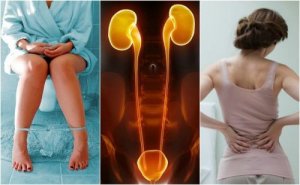Seven Symptoms of Kidney Failure You Should Know


Reviewed and approved by the doctor Maricela Jiménez López
Kidney failure symptoms can be range from lower back pain to many others. Of course, the intensity will depend on each case.
In fact, during the day, they can process up to 150 quarts of blood which, after a filtration process, allows us to expel around 2 quarts of water and waste. Furthermore, since they participate in the control of blood pressure and the secretion of some hormones, there is no doubt that kidney health determines our well-being.
In summary, as Dr. Pérez Feito indicates, its main function is “to maintain the internal environment stable in spite of the variations of climate, diet and other external factors”.
Due to this, it is essential to attend to any signs of anomalies or diseases in a timely matter, since any kidney failure symptoms could lead to the development of chronic problems.
On this occasion, we have collected 7 kidney failure symptoms that can appear when something isn’t quite right with your system.
The symptoms of kidney failure
1. Fluid retention and inflammation

One of the initial signs of renal failure is uncontrolled inflammation in the body, which is usually accompanied by fluid retention. Furthermore, these kidney failure symptoms are the result of the kidneys having difficulties filtering waste and producing urine. As a result, this causes waste to remain in the tissues.
Consult your doctor if you notice unusual inflammation in the:
- Face
- Hands
- Legs
- Abdomen
- Feet and ankles
Check out these Seven Tips to Avoid Fluid Retention
2. Loss of bladder control
You should take bladder control problems into account as one of many possible kidney failure symptoms.
An increase in the number of visits to the bathroom, or a reduction for no apparent reason, indicates that there may be some abnormality in the function of the kidneys.
3. Noticeable changes in the urine

The texture, color, and odor of urine are characteristics that allow us to detect if the kidneys are having difficulties completing their tasks.
Noticeable changes, such as a more yellowish color than normal, could be warning signs of infections or chronic problems. It is also necessary to consult a doctor if:
- It burns when urinating
- Urine is foamy
- There is blood in your urine
- The smell is too strong or unpleasant
4. Skin rashes
Although rashes can appear due to multiple factors, a malfunction of the kidneys could explain their presence.
The organs fail to filter some toxins, which remain in the bloodstream. In addition, after the body transports them, they alter the normal production of oils from the skin. As a consequence, unsightly acne may appear. However, it is almost always accompanied by an annoying sensation of itching and irritation.
5. Pain in the lower back

Although it may be a weakening of the muscles, we must not rule out the possibility that there is a problem with these organs.
6. Kidney failure symptoms: high blood pressure
Patients diagnosed with kidney failure or kidney disease must constantly check their blood pressure. This is because they can suffer serious alterations.
The functions performed by these organs help to keep in balance the levels of potassium and sodium, two key minerals that maintain blood pressure stability. They also keep fluids in the body under control, while avoiding inflammation of the tissues and arteries.
However, bear in mind that hypertension can originate from a problem known as renal artery stenosis, which causes a partial obstruction of the artery that carries blood to the kidneys.
Make this Delicious Morning Shake for Controlling High Blood Pressure
7. Fatigue

When the kidneys fail in their functions, it is common for patients to have a feeling of fatigue and lack of energy. This is due to the decreased production of a hormone known as erythropoietin. This is responsible for creating red blood cells in the blood in order to optimize the transport of oxygen and nutrients.
Its disarray can lead to chronic anemia, as well as dizziness and concentration problems.
What to do if you have kidney failure symptoms
If you feel you’re experiencing the above-mentioned symptoms or other discomforts that have affected your day-to-day life, it’s best to consult your doctor as soon as possible. Furthermore, keep in mind that many of the kidney problems can be corrected if they’re detected in their early stages.
Address any warning signs immediately, and try to adopt healthy habits that reduce the risk.
All cited sources were thoroughly reviewed by our team to ensure their quality, reliability, currency, and validity. The bibliography of this article was considered reliable and of academic or scientific accuracy.
- Blaha, T., Nigwekar, S., Combs, S., Kaw, U., Krishnappa, V., & Raina, R. (2019). Dermatologic manifestations in end stage renal disease. Hemodialysis International, 23(1), 3-18. https://onlinelibrary.wiley.com/doi/abs/10.1111/hdi.12689
- Bobkova, I., Chebotareva, N., Kozlovskaya, L., & Shilov, E. (2016). Edema in renal diseases–current view on pathogenesis. Nephrology@ Point of Care, 2(1), pocj-5000204. https://journals.sagepub.com/doi/full/10.5301/pocj.5000204
- Carvajal-Carvajal, C. (2017). Proteinuria y microalbuminuria. Medicina Legal de Costa Rica, 34(1), 194-201. https://www.scielo.sa.cr/scielo.php?pid=S1409-00152017000100194&script=sci_arttext
- Evans, H. L., & Bulger, E. M. (2016). Oliguria. In R. Rabinovici., H. Lee. & O. Kirton (Eds.) Trauma, Critical Care and Surgical Emergencies (pp. 322-328). CRC Press. https://www.taylorfrancis.com/chapters/edit/10.3109/9781420021134-35/oliguria-heather-evans-eileen-bulger
- Hernández, R. V., González, M. R., Polar, E. O., del Tánago, P. G. G., Martín-Sonseca, S., & Carlavilla, F. J. P. (2018). Hematuria. Panorama actual del medicamento, 42(411), 186-190. https://dialnet.unirioja.es/servlet/articulo?codigo=6427919
- Herrmann, S. M., & Textor, S. C. (2019). Renovascular hypertension. Endocrinology and Metabolism Clinics, 48(4), 765-778. https://pubmed.ncbi.nlm.nih.gov/31655775/
- Vahdat, S. (2020). Vitamin D and kidney diseases: a narrative review. International journal of preventive medicine, 11(1), 195. https://journals.lww.com/ijom/fulltext/2020/11000/expected_rate_of_covid_19_among_returning_myanmar.195.aspx
- Yuan, M., Chen, X., Ou, R., Luo, R., Fan, W., Wang, X., & Guo, Z. (2024). Renal anemia: from relative insufficiency of EPO to imbalance of erythropoiesis and eryptosis. International Urology and Nephrology, 1-10. https://link.springer.com/article/10.1007/s11255-024-04146-x
This text is provided for informational purposes only and does not replace consultation with a professional. If in doubt, consult your specialist.








